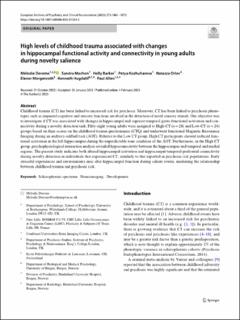High levels of childhood trauma associated with changes in hippocampal functional activity and connectivity in young adults during novelty salience
Derome, Melodie; Machon, Sandra; Barker, Holly; Kozuharova, Petya; Orlov, Natasza; Morgenroth, Elenor; Hugdahl, Kenneth Jan; Allen, Paul
Journal article, Peer reviewed
Published version

Åpne
Permanent lenke
https://hdl.handle.net/11250/3117358Utgivelsesdato
2023Metadata
Vis full innførselSamlinger
Originalversjon
European Archives of Psychiatry and Clinical Neuroscience. 2023, 273, 1061-1072. 10.1007/s00406-023-01564-3Sammendrag
Childhood trauma (CT) has been linked to increased risk for psychosis. Moreover, CT has been linked to psychosis phenotypes such as impaired cognitive and sensory functions involved in the detection of novel sensory stimuli. Our objective was to investigate if CT was associated with changes in hippocampal and superior temporal gyrus functional activation and connectivity during a novelty detection task. Fifty-eight young adults were assigned to High-CT (n = 28) and Low-CT (n = 24) groups based on their scores on the childhood trauma questionnaire (CTQ) and underwent functional Magnetic Resonance Imaging during an auditory oddball task (AOT). Relative to the Low CT group, High CT participants showed reduced functional activation in the left hippocampus during the unpredictable tone condition of the AOT. Furthermore, in the High CT group, psychophysiological interaction analysis revealed hypoconnectivity between the hippocampus and temporal and medial regions. The present study indicates both altered hippocampal activation and hippocampal-temporal-prefrontal connectivity during novelty detection in individuals that experienced CT, similarly to that reported in psychosis risk populations. Early stressful experiences and environments may alter hippocampal function during salient events, mediating the relationship between childhood trauma and psychosis risk.
